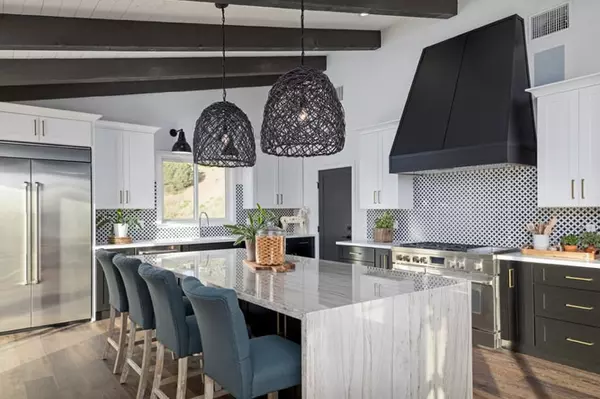
Discover the Benefits: Why You Should Consider Moving to a Gated Community
Are you contemplating a move and wondering if a gated community is the right choice for you? Gated communities offer a host of amenities and advantages that make them an attractive option for many homebuyers. In this blog post, we'll explore the benefits of living in a gated community and why it might be the perfect fit for your lifestyle. From enhanced security to exclusive amenities, we'll delve into the reasons why you should consider making the move to a gated community. 1. Enhanced Security: Protecting Your Peace of Mind One of the most significant advantages of living in a gated community is enhanced security and peace of mind. Gated communities typically have controlled access points, security patrols, and surveillance systems, reducing the risk of unauthorized entry and enhancing overall safety for residents. With limited access to outsiders, gated communities provide a secure environment where you can feel confident and secure in your home. 2. Exclusive Amenities: Enjoying Resort-Style Living Gated communities often boast a wide range of exclusive amenities that enhance residents' quality of life and provide opportunities for recreation and relaxation. From swimming pools and fitness centers to tennis courts and walking trails, gated communities offer resort-style living with convenient access to upscale facilities and activities. Enjoying these amenities can enhance your lifestyle and foster a sense of community among residents. 3. Privacy and Exclusivity: Creating a Sense of Seclusion Privacy and exclusivity are key features of gated communities, offering residents a sense of seclusion and tranquility away from the hustle and bustle of urban life. With limited through traffic and controlled access points, gated communities provide a quieter and more peaceful living environment where you can enjoy privacy and solitude without sacrificing convenience or accessibility. 4. Tight-Knit Community: Building Stronger Connections Living in a gated community often fosters a sense of camaraderie and community among residents, creating opportunities for social interaction and connection. Gated communities often host social events, clubs, and activities that bring neighbors together and promote a sense of belonging. Whether it's a neighborhood barbecue, fitness class, or book club, living in a gated community can help you build stronger connections with your neighbors and forge lasting friendships. 5. Property Value Appreciation: Investing in Your Future Investing in a home in a gated community can be a smart financial decision, as properties in gated communities often appreciate at a higher rate than those in non-gated neighborhoods. The enhanced security, exclusive amenities, and desirable lifestyle associated with gated communities attract buyers willing to pay a premium for quality living. By purchasing a home in a gated community, you're not only investing in your present quality of life but also securing your financial future. Conclusion: Moving to a gated community offers a myriad of benefits, from enhanced security and exclusive amenities to privacy, community, and property value appreciation. Whether you're seeking a safer environment for your family, a more luxurious lifestyle, or a stronger sense of community, gated communities provide the ideal setting to achieve your goals. Consider the advantages of gated living and explore the options available to find the perfect gated community that meets your needs and enhances your quality of life.

Homeowners Insurance 101: Essential Knowledge for First-Time Homebuyers
Are you a first-time homebuyer preparing to purchase your dream home? Understanding the basics of homeowners insurance is crucial for protecting your investment and ensuring peace of mind. In this blog post, we'll provide you with essential information about homeowners insurance, including coverage options, policy types, and factors to consider when selecting a policy. Whether you're in the process of buying your first home or exploring insurance options, this guide will help you make informed decisions and safeguard your new investment. 1. What is Homeowners Insurance? Homeowners insurance is a type of insurance policy designed to protect homeowners from financial losses resulting from damage to their property or liability for injuries and property damage caused by accidents on their premises. This insurance provides coverage for a wide range of risks, including natural disasters, theft, vandalism, and personal liability claims. By purchasing homeowners insurance, you can protect your home, personal belongings, and finances from unexpected events and liabilities. 2. Types of Coverage: Understanding Your Options There are several types of coverage included in a standard homeowners insurance policy, each offering protection for different aspects of your home and belongings. The main types of coverage typically included in homeowners insurance are: - Dwelling coverage: Provides protection for the structure of your home against damage or destruction caused by covered perils such as fire, windstorms, and hail.- Personal property coverage: Covers the contents of your home, including furniture, electronics, clothing, and other personal belongings, against theft, loss, or damage.- Liability coverage: Offers financial protection if you're found responsible for injuries to others or damage to their property while on your premises. This coverage can also help cover legal expenses and court judgments.- Additional living expenses (ALE) coverage: Reimburses you for additional living expenses incurred if you're temporarily displaced from your home due to a covered loss, such as a fire or natural disaster. Understanding the types of coverage available and selecting the appropriate coverage limits for your needs is essential for ensuring adequate protection and peace of mind. 3. Factors Affecting Premiums: What Determines Your Insurance Costs? Several factors can influence the cost of homeowners insurance premiums, including: - Location: The geographic location of your home can impact insurance premiums, with areas prone to natural disasters or high crime rates typically resulting in higher premiums.- Home characteristics: Factors such as the age, size, construction materials, and condition of your home can affect insurance costs. Newer homes with modern building materials and safety features may qualify for lower premiums.- Coverage limits: The amount of coverage you select for your home, personal belongings, and liability protection will impact your insurance premiums. Higher coverage limits typically result in higher premiums.- Deductible amount: The deductible is the amount you're responsible for paying out of pocket before your insurance coverage kicks in. Choosing a higher deductible can lower your premiums but may require you to pay more upfront in the event of a claim. By understanding these factors and working with an insurance agent to customize your policy to fit your needs and budget, you can find the right balance between coverage and affordability. 4. Additional Considerations: Tailoring Your Policy to Your Needs In addition to standard coverage options, homeowners insurance policies may offer optional endorsements or riders that provide additional protection for specific risks or valuables. Common endorsements include: - Flood insurance: Provides coverage for damage caused by flooding, which is typically not covered by standard homeowners insurance policies.- Scheduled personal property coverage: Offers additional coverage for high-value items such as jewelry, art, antiques, or collectibles that may exceed the limits of your standard personal property coverage.- Umbrella liability insurance: Provides extended liability coverage beyond the limits of your standard homeowners policy, offering additional protection against catastrophic events or large liability claims. Reviewing your policy options and considering any additional coverage needs can help you tailor your homeowners insurance policy to provide comprehensive protection for your home and assets. Conclusion: Homeowners insurance is an essential component of homeownership, offering financial protection and peace of mind in the face of unexpected events and liabilities. By understanding the basics of homeowners insurance, including coverage options, factors affecting premiums, and additional considerations, you can make informed decisions when selecting a policy that meets your needs and budget. Working with an experienced insurance agent to customize your policy and address any questions or concerns will ensure that you have the right coverage in place to protect your new home and belongings for years to come.

Say Goodbye to Fungus Gnats: Effective Ways to Eliminate Them at Home
Are you dealing with pesky fungus gnats invading your home? These tiny flying insects can be a nuisance, especially when they start multiplying rapidly. Fortunately, there are several effective methods to get rid of fungus gnats and prevent them from returning. In this blog post, we'll explore practical solutions and expert tips to help you tackle the fungus gnat problem and reclaim your indoor space. From natural remedies to preventive measures, we've got you covered with everything you need to know to keep your home fungus gnat-free. 1. Identify the Problem: Understanding Fungus Gnats Before you can effectively eliminate fungus gnats, it's essential to understand what they are and where they come from. Fungus gnats are small, dark-colored flies that are attracted to moist environments, organic matter, and decaying plant material. They often infest potted plants, soil, and damp areas around the home, where they lay their eggs and feed on organic debris. By recognizing the signs of a fungus gnat infestation, such as tiny flying insects hovering around plants or soil, you can take proactive steps to address the problem promptly. 2. Remove Breeding Sites: Keep Your Home Clean and Dry To eliminate fungus gnats effectively, it's crucial to remove their breeding sites and eliminate sources of moisture and organic matter. Start by inspecting your indoor plants and potting soil for signs of fungus gnat larvae, which resemble tiny white worms. Remove any decaying plant material, dead leaves, or debris from the soil surface, and avoid overwatering your plants to prevent soil from becoming waterlogged. Additionally, ensure proper drainage in plant pots and containers to prevent standing water, which can attract fungus gnats and facilitate breeding. 3. Use Natural Remedies: Safe and Eco-Friendly Solutions Natural remedies can be highly effective in controlling fungus gnats without the use of harsh chemicals or pesticides. One popular method is to create homemade gnat traps using apple cider vinegar or dish soap mixed with water. Place these traps near infested plants to attract and trap adult fungus gnats, reducing their population over time. You can also incorporate beneficial nematodes into the soil, which are natural predators of fungus gnat larvae and help control infestations without harming plants or other beneficial insects. 4. Apply Chemical Treatments: Targeted Solutions for Severe Infestations In cases of severe fungus gnat infestations, chemical treatments may be necessary to achieve effective control. Consider using insecticidal sprays or drenches specifically formulated to target fungus gnats and their larvae. Be sure to follow the manufacturer's instructions carefully and apply treatments only as directed to minimize risks to humans, pets, and beneficial insects. Keep in mind that chemical treatments should be used as a last resort and in conjunction with other control methods for best results. 5. Implement Preventive Measures: Maintain a Fungus Gnat-Free Environment Once you've eliminated fungus gnats from your home, it's essential to implement preventive measures to keep them from returning. Maintain good sanitation practices by regularly cleaning up spills, removing decaying plant material, and avoiding overwatering. Monitor your indoor plants for signs of pests or disease and quarantine new plants before introducing them to your home. Additionally, consider using sticky traps or yellow sticky cards to monitor fungus gnat activity and detect any new infestations early. Conclusion: Dealing with fungus gnats can be frustrating, but with the right strategies and preventive measures, you can effectively eliminate these pests and prevent them from returning. By identifying breeding sites, using natural remedies, applying targeted treatments, and implementing preventive measures, you can keep your home fungus gnat-free and enjoy a healthier indoor environment. Remember to stay vigilant and proactive in managing fungus gnat infestations to protect your plants and maintain a pest-free home.

Wedding Bells and Home Buying: Tips for Purchasing a Home Before Tying the Knot
Are you and your partner considering buying a home together before your wedding day? Purchasing a home is a significant milestone in any relationship, and doing so before getting married can add an extra layer of excitement and commitment to your journey as a couple. In this blog post, we'll explore the ins and outs of buying a home before the wedding and share expert tips to help you navigate the process successfully. From financial considerations to legal protections, we'll cover everything you need to know to make informed decisions and start your married life off on the right foot. 1. Assess Your Financial Situation: Determine What You Can Afford Before diving into the home buying process, it's essential to assess your financial situation and determine what you can afford as a couple. Start by reviewing your combined incomes, savings, and debts to calculate your maximum homebuying budget. Consider factors such as down payment amount, monthly mortgage payments, property taxes, and homeowners insurance premiums to ensure you're comfortable with the financial commitment. Working with a trusted financial advisor or mortgage lender can help you evaluate your options and determine a realistic budget for your home purchase. 2. Have Open and Honest Conversations: Discuss Your Goals and Expectations Buying a home together is a significant decision that requires open and honest communication between partners. Take the time to discuss your goals, priorities, and expectations for homeownership before proceeding with the purchase. Talk about your long-term plans, such as starting a family, career aspirations, and lifestyle preferences, to ensure you're on the same page. Consider creating a shared vision board or checklist to outline your must-haves and deal-breakers for your future home, helping you narrow down your search and make decisions together. 3. Plan for the Future: Consider Legal and Financial Protections While buying a home before the wedding can be exciting, it's essential to plan for the future and consider legal and financial protections for both partners. Discuss options for joint ownership of the property, such as tenants in common or joint tenancy with rights of survivorship, and consult with a real estate attorney to draft a cohabitation agreement or prenuptial agreement to protect your interests. Additionally, consider obtaining life insurance policies and drafting wills or estate plans to ensure that both partners are financially protected in the event of unforeseen circumstances. 4. Be Flexible and Patient: Stay Calm Amidst the Challenges Buying a home before the wedding can be a whirlwind experience filled with excitement and challenges. Be prepared to encounter obstacles along the way, such as competitive housing markets, financing delays, or unexpected home inspection issues. Stay flexible and patient throughout the process, and be willing to compromise on certain aspects of your home search to find a property that meets your needs and budget. Lean on each other for support, and remember that communication and teamwork are key to overcoming obstacles and achieving your homeownership goals together. 5. Celebrate Your Milestone: Create Lasting Memories in Your New Home After successfully purchasing a home together before the wedding, take the time to celebrate your milestone and create lasting memories in your new home. Host a housewarming party for friends and family to share in your joy and excitement, and take photos to commemorate the occasion. Start making plans for personalizing and decorating your new space together, whether it's choosing paint colors, shopping for furniture, or planting a garden. Embrace this new chapter in your relationship and cherish the memories you'll create as homeowners and soon-to-be newlyweds. Conclusion: Buying a home before the wedding is an exciting and rewarding experience that can strengthen your bond as a couple and set the stage for a happy and fulfilling future together. By assessing your financial situation, having open and honest conversations, planning for the future, staying flexible and patient, and celebrating your milestone, you can navigate the homebuying process with confidence and create lasting memories in your new home. With careful planning and teamwork, you'll be well on your way to building a life together filled with love, happiness, and homeownership.
Categories
Recent Posts










